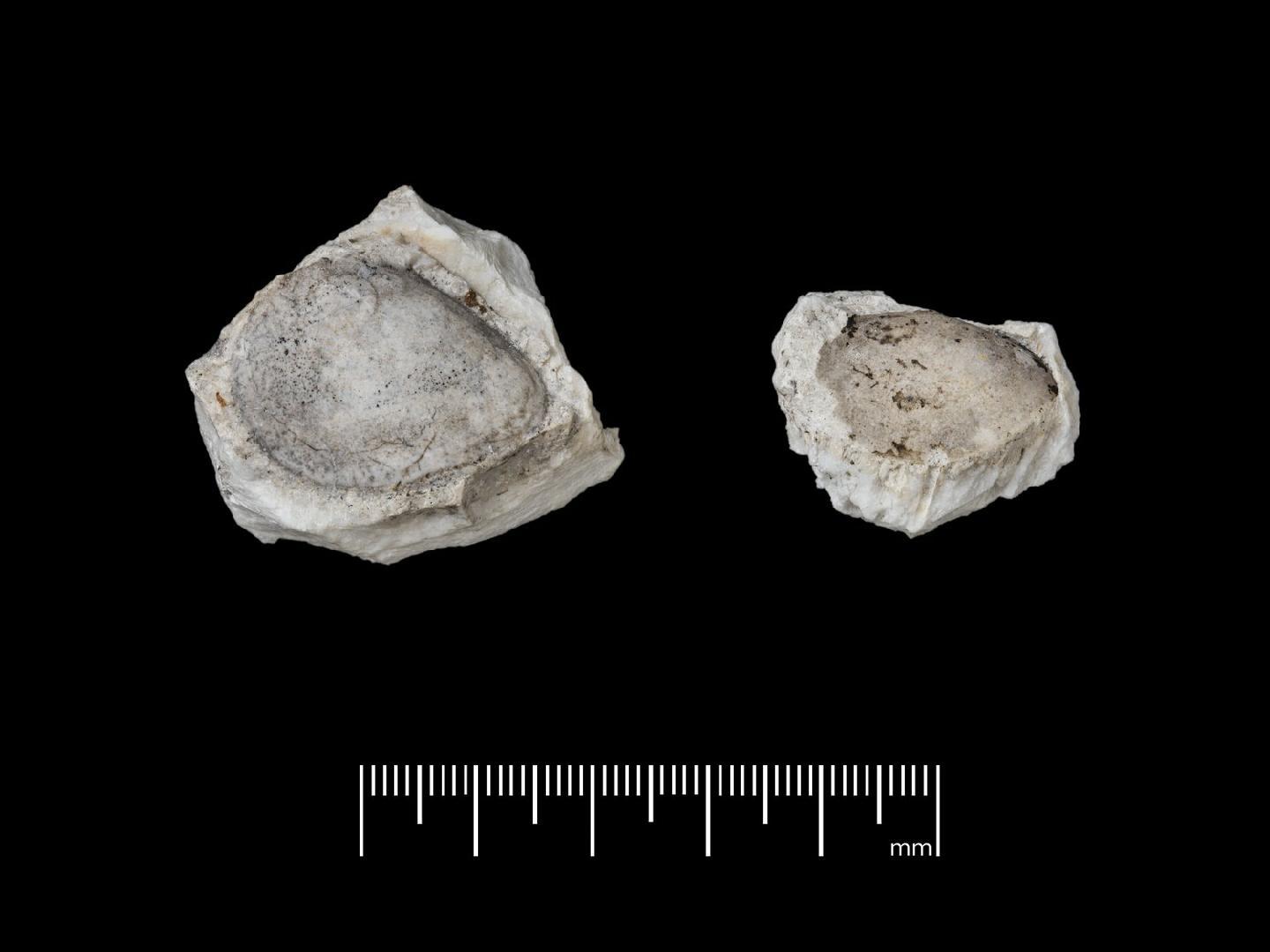WoRMS taxon details
Clavagella Blainville, 1817
137792 (urn:lsid:marinespecies.org:taxname:137792)
accepted
Genus
Fistulana echinata Lamarck, 1806 † accepted as Clavagella echinata (Lamarck, 1806) † (type by subsequent designation)
Bacilia Gray, 1858 † · unaccepted (objective synonym)
Clavagella (Clavagella) Blainville, 1817 † · unaccepted > superseded rank
- Subgenus Clavagella (Stirpulina) Stoliczka, 1870 accepted as Stirpulina Stoliczka, 1870 (unaccepted > superseded combination)
- Subgenus Clavagella (Stirpuliniola) Kuroda & Habe, 1971 accepted as Stirpulina Stoliczka, 1870
- Species Clavagella aligamenta (B. Morton, 2005) accepted as Bryopa aligamenta B. Morton, 2005 (unaccepted > superseded combination)
- Species Clavagella angulata R. A. Philippi, 1844 accepted as Bryopa melitensis (Broderip, 1834)
- Species Clavagella aperta G. B. Sowerby I, 1823 accepted as Bryopa aperta (G. B. Sowerby I, 1823)
- Species Clavagella australis G. B. Sowerby I, 1827 accepted as Dacosta australis (G. B. Sowerby I, 1827)
- Species Clavagella balanorum R. A. Philippi, 1840 accepted as Bryopa aperta (G. B. Sowerby I, 1823)
- Species Clavagella elongata Broderip, 1834 accepted as Clavagella lata Broderip, 1834 accepted as Bryopa lata (Broderip, 1834) (junior synonym)
- Species Clavagella japonica Habe, 1981 accepted as Dianadema japonica (Habe, 1981)
- Species Clavagella laqueata G. B. Sowerby II, 1872 accepted as Clavagella melitensis Broderip, 1834 accepted as Bryopa melitensis (Broderip, 1834)
- Species Clavagella lata Broderip, 1834 accepted as Bryopa lata (Broderip, 1834) (original combination)
- Species Clavagella mascarenensis (P. G. Oliver & Holmes, 2004) accepted as Dianadema mascarenensis P. G. Oliver & Holmes, 2004 accepted as Dianadema minima (G. B. Sowerby III, 1889)
- Species Clavagella melitensis Broderip, 1834 accepted as Bryopa melitensis (Broderip, 1834) (unaccepted > superseded combination)
- Species Clavagella minima G. B. Sowerby III, 1889 accepted as Dianadema minima (G. B. Sowerby III, 1889)
- Species Clavagella mullerae Kilburn, 1974 accepted as Dianadema mullerae (Kilburn, 1974)
- Species Clavagella multangularis (Tate, 1887) accepted as Dianadema multangularis (Tate, 1887)
- Species Clavagella philippiana G. B. Sowerby II, 1872 accepted as Bryopa aperta (G. B. Sowerby I, 1823)
- Species Clavagella ramosa Dunker, 1882 accepted as Stirpulina ramosa (Dunker, 1882)
- Species Clavagella sicula Delle Chiaje, 1830 accepted as Bryopa aperta (G. B. Sowerby I, 1823)
- Species Clavagella torresi E. A. Smith, 1885 accepted as Dianadema torresi (E. A. Smith, 1885) (original combination)
- Subgenus Clavagella (Bryopa) Gray, 1847 represented as Bryopa Gray, 1847
- Species Clavagella (Bryopa) aperta G. B. Sowerby I, 1823 represented as Bryopa aperta (G. B. Sowerby I, 1823)
- Species Clavagella adenensis Jousseaume, 1888 (uncertain > taxon inquirendum)
marine
recent + fossil
Blainville, H. M. D. de. (1817). Clavagelle, <i>Clavagella</i> (Conch.). pp. 366-367, in: Dictonnaire des Sciences Naturelles (F. Cuvier, ed.), vol. 9. Levrault, Strasbourg & Le Normant, Paris. , available online at https://www.biodiversitylibrary.org/page/23024391
page(s): 366 [details]
page(s): 366 [details]
Taxonomy In his overview paper, Morton (2007) separated off a family Penicillidae for Penicillus, Brechites, Foegia, Nipponoclava,...
Taxonomy In his overview paper, Morton (2007) separated off a family Penicillidae for Penicillus, Brechites, Foegia, Nipponoclava, Kendrickiana and Humphreyia, from the Clavagellidae containing the extinct genus Clavagella and the extant genera Dacosta, Bryopa, Dianadema and Stirpulina. The tube or "crypt" in which these taxa live in the sediment, or attached to shells, etc., is formed in quite different ways in the two families, and Morton (2007) suggested that they evolved from distinct lyonsiid ancestors. This vuew is disregarded by Huber (2010) who finds this splitting exaggerated and considers all the Clavagellidae sensu Morton (2007) as subgenera of Clavagella Lamarck, 1818 [details]
MolluscaBase eds. (2024). MolluscaBase. Clavagella Blainville, 1817. Accessed through: World Register of Marine Species at: https://www.marinespecies.org/aphia.php?p=taxdetails&id=137792 on 2024-04-24
Date
action
by
![]() The webpage text is licensed under a Creative Commons Attribution 4.0 License
The webpage text is licensed under a Creative Commons Attribution 4.0 License
original description
Blainville, H. M. D. de. (1817). Clavagelle, <i>Clavagella</i> (Conch.). pp. 366-367, in: Dictonnaire des Sciences Naturelles (F. Cuvier, ed.), vol. 9. Levrault, Strasbourg & Le Normant, Paris. , available online at https://www.biodiversitylibrary.org/page/23024391
page(s): 366 [details]
basis of record Gofas, S.; Le Renard, J.; Bouchet, P. (2001). Mollusca. in: Costello, M.J. et al. (eds), European Register of Marine Species: a check-list of the marine species in Europe and a bibliography of guides to their identification. <em>Patrimoines Naturels.</em> 50: 180-213., available online at http://www.vliz.be/imisdocs/publications/ocrd/254404.pdf [details]
additional source Morton B. 2007. The evolution of the watering pot shells (Bivalvia, Anomalodesmata: Clavagellidae and Penicillidae). <i>Records of the Western Australian Museum</i> 24: 19-64. [details]
page(s): 366 [details]
basis of record Gofas, S.; Le Renard, J.; Bouchet, P. (2001). Mollusca. in: Costello, M.J. et al. (eds), European Register of Marine Species: a check-list of the marine species in Europe and a bibliography of guides to their identification. <em>Patrimoines Naturels.</em> 50: 180-213., available online at http://www.vliz.be/imisdocs/publications/ocrd/254404.pdf [details]
additional source Morton B. 2007. The evolution of the watering pot shells (Bivalvia, Anomalodesmata: Clavagellidae and Penicillidae). <i>Records of the Western Australian Museum</i> 24: 19-64. [details]
 Present
Present  Inaccurate
Inaccurate  Introduced: alien
Introduced: alien  Containing type locality
Containing type locality
From editor or global species database
Taxonomy In his overview paper, Morton (2007) separated off a family Penicillidae for Penicillus, Brechites, Foegia, Nipponoclava, Kendrickiana and Humphreyia, from the Clavagellidae containing the extinct genus Clavagella and the extant genera Dacosta, Bryopa, Dianadema and Stirpulina. The tube or "crypt" in which these taxa live in the sediment, or attached to shells, etc., is formed in quite different ways in the two families, and Morton (2007) suggested that they evolved from distinct lyonsiid ancestors. This vuew is disregarded by Huber (2010) who finds this splitting exaggerated and considers all the Clavagellidae sensu Morton (2007) as subgenera of Clavagella Lamarck, 1818 [details]
